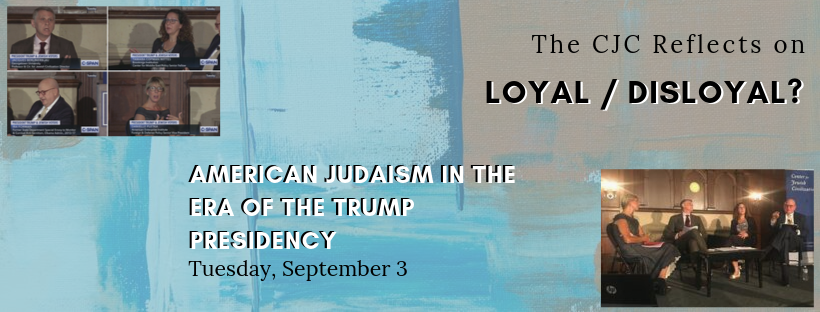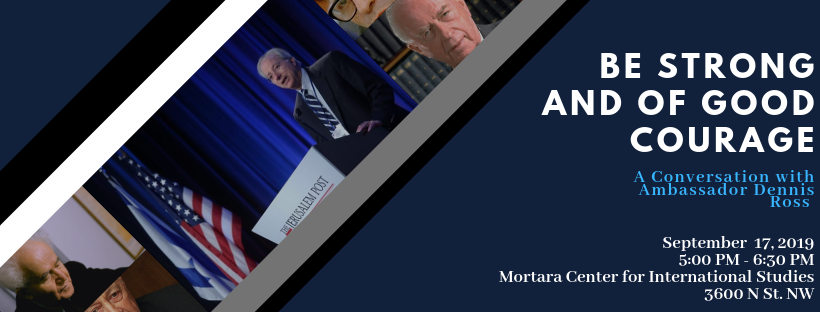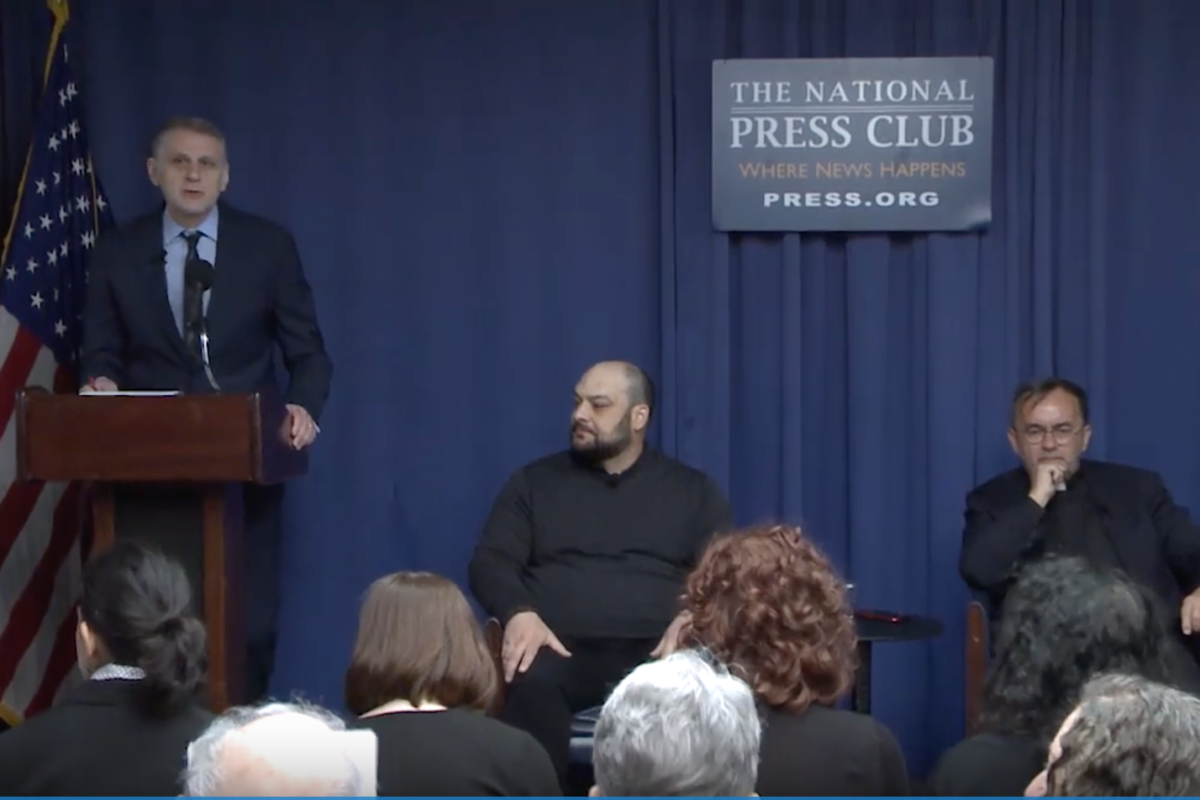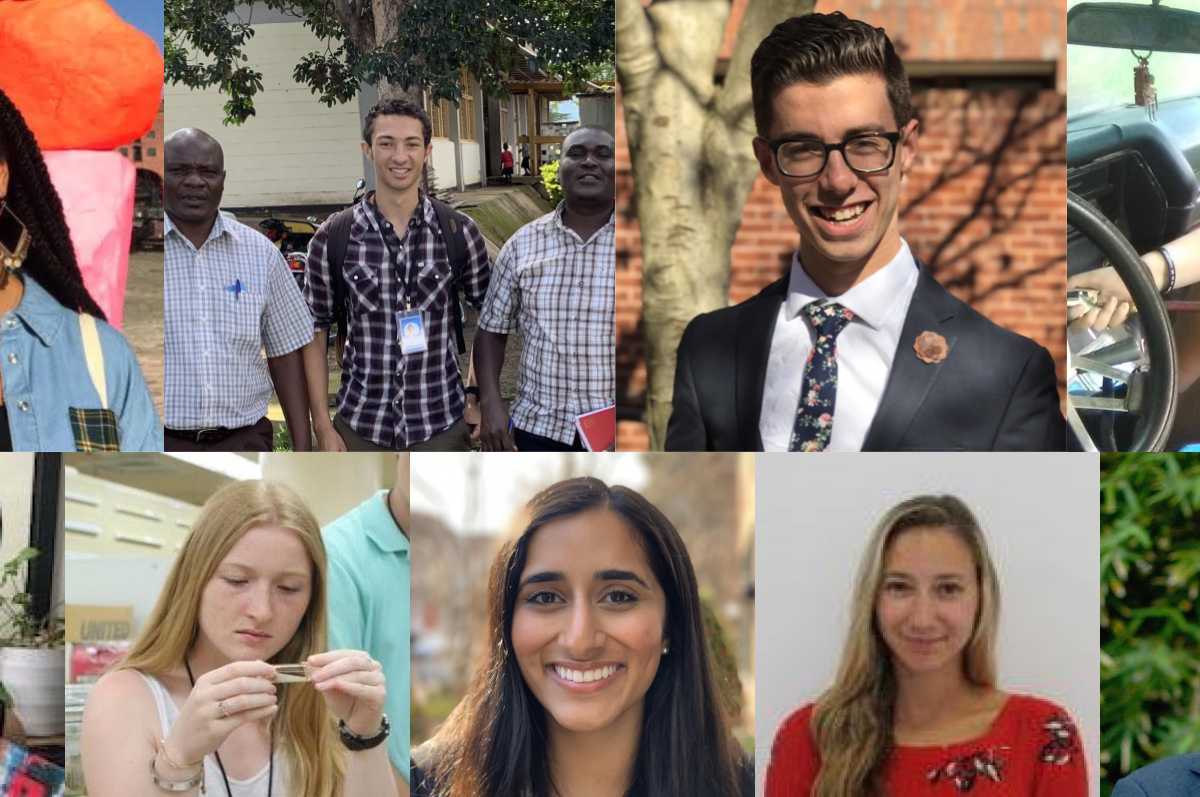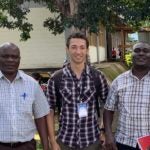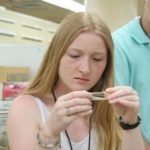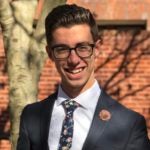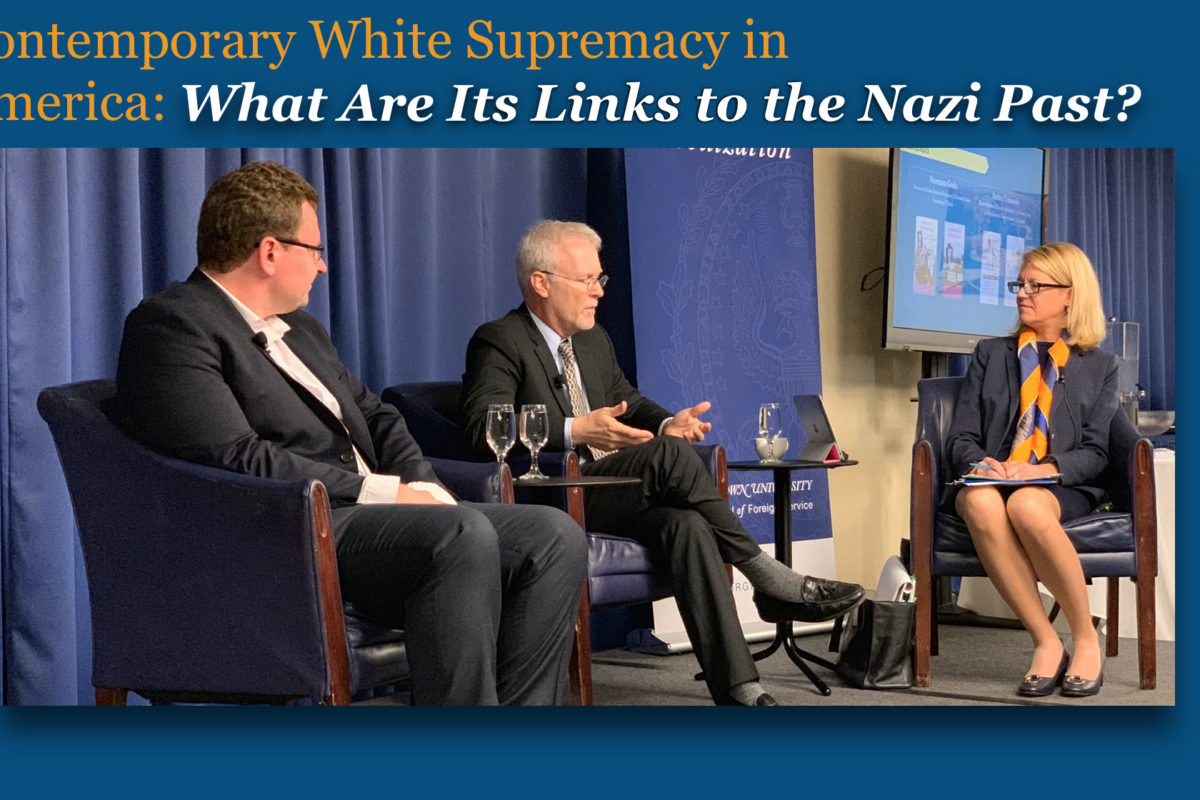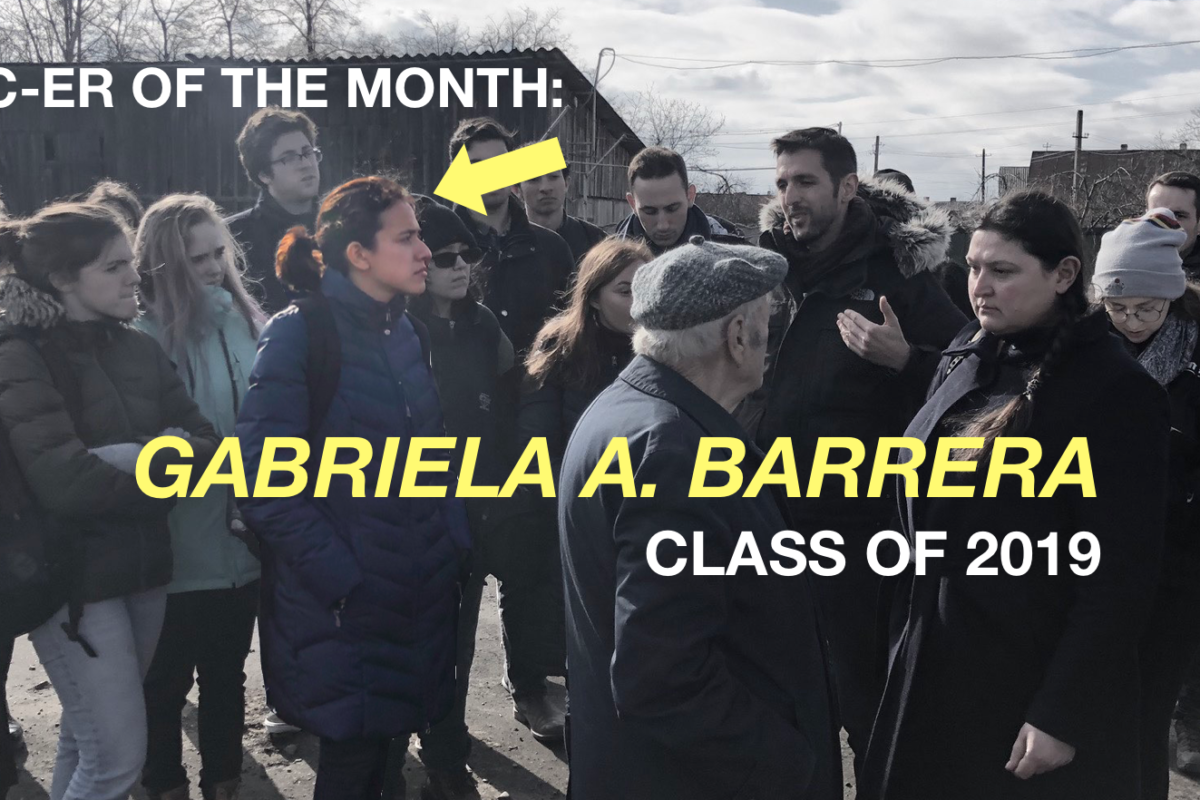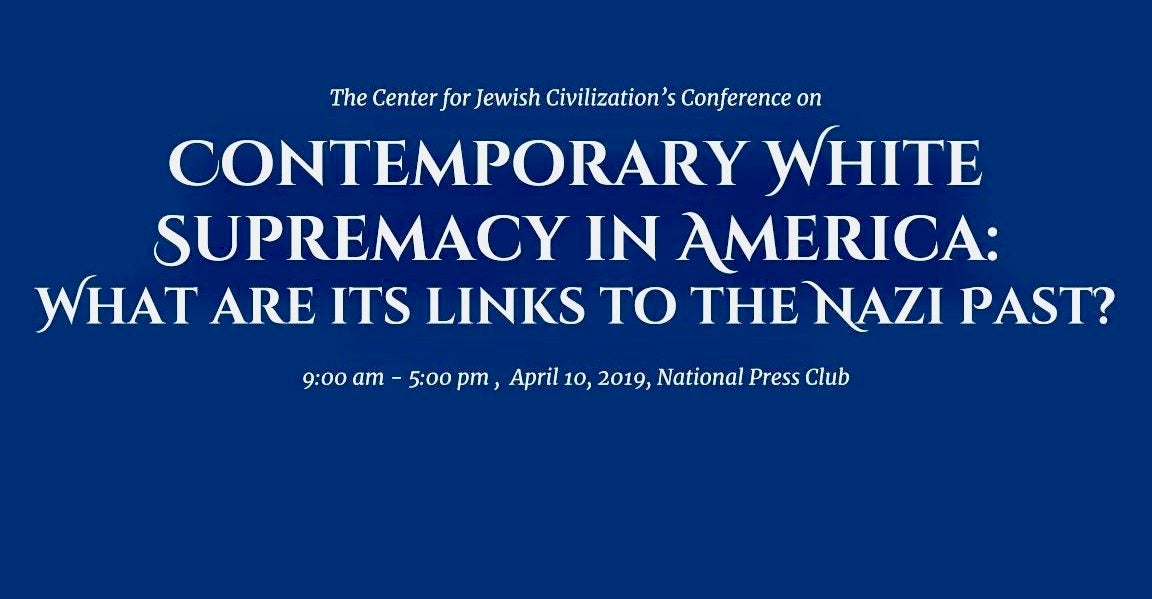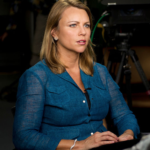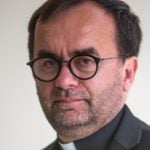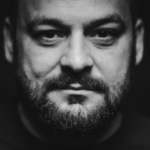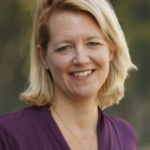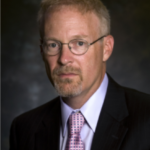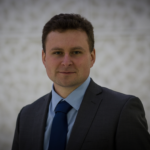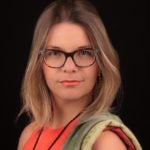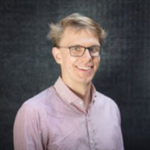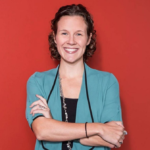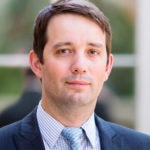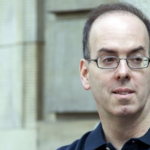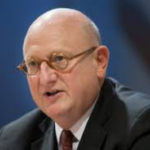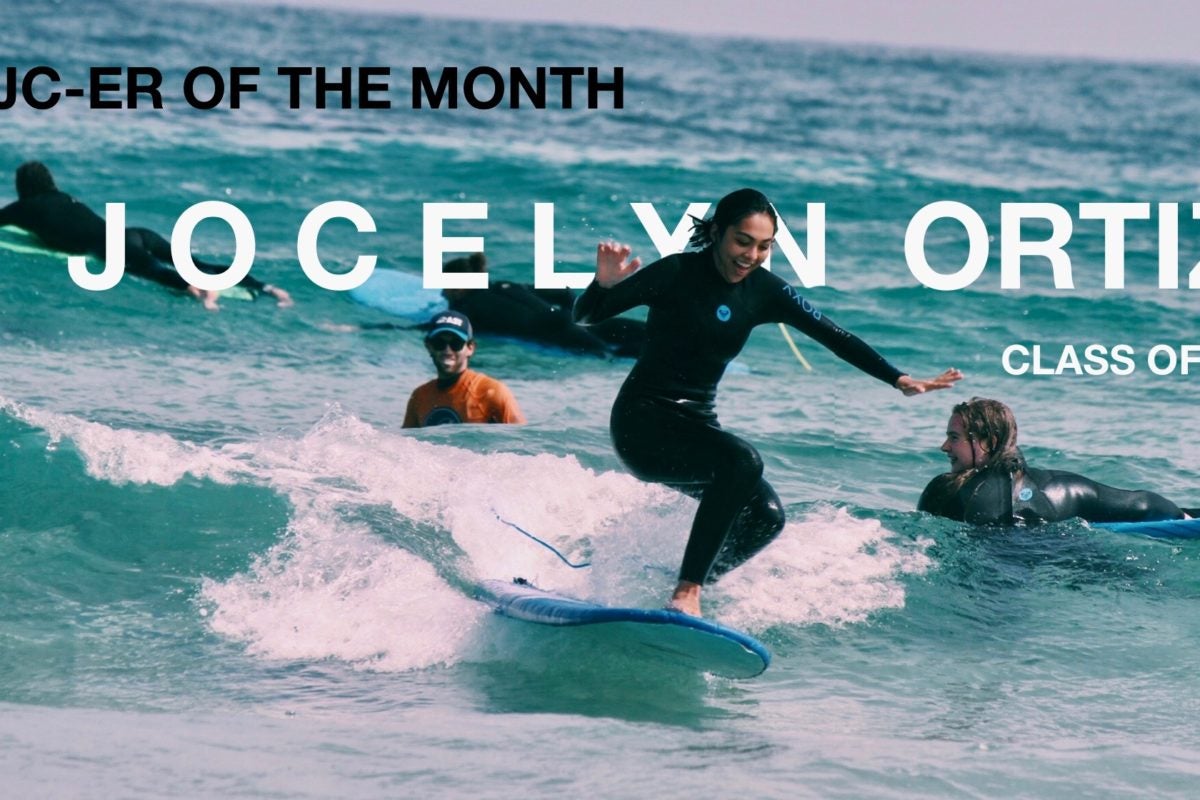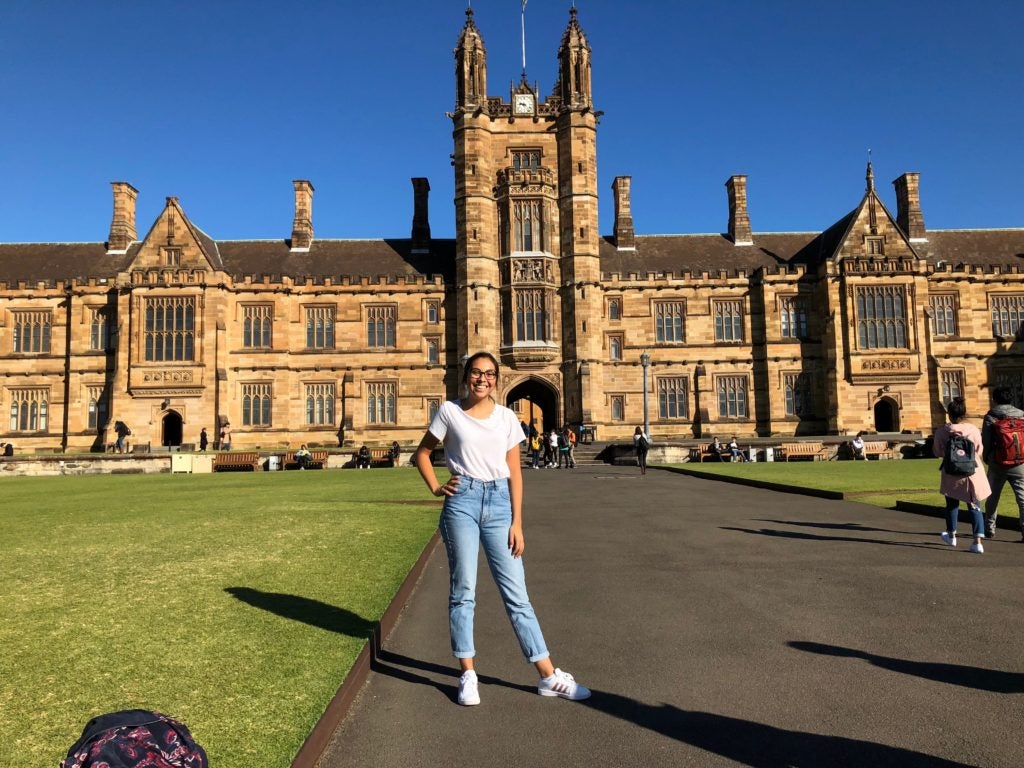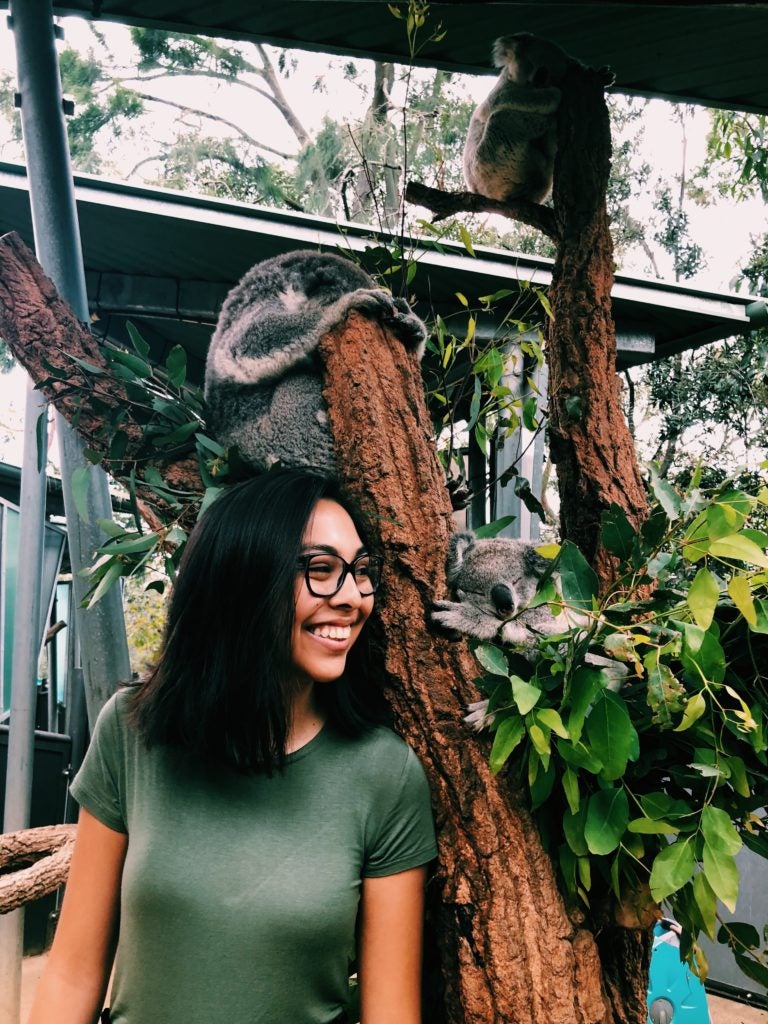The CJC Reflects on American Judaism in the Era of the Trump Presidency
Summary
On September 3rd, the Center for Jewish Civilization (CJC) had its first event of the year. The discussion between CJC Professors Ira Forman, Danielle Pletka, Tamara Cofman Wittes and Jacques Berlinerblau was centered on remarks made by President Donald J. Trump about loyal and disloyal Jewish Americans. Trump’s comments triggered anger and denunciations from a broad spectrum of American voices. Crucially, they are triangulated against two salient features of his presidency. First, his tight embrace of the Netenyahu administration, and second, the disturbing rise of white supremacist violence directed against Jews and others in the United States. Center for Jewish Civilization Director Berlinerblau interviewed the three thought leaders, each of whom share extensive knowledge on issues pertaining to the Middle East and American politics.
Notable Moments
A round-up of notable moments during the event can be found on the CJC’s Twitter account, which includes live tweets published during the event. Follow the hashtag #LoyalDisloyal! Below is a list of standout quotes from the event:
- “The rise in antisemitic hate crimes, violent and nonviolent, is part of a context in our political discourse which has become corrosive to the bonds that hold us together. What’s happening to make Jewish Americans less secure is happening to America.” – Tamara Cofman Wittes
- “The Jews are separate from Israel and the Middle East. As much as President Trump seems confused about this, that is 100 percent the truth.” – Danielle Pletka
- “With all our problems of antisemitism here, we are the safest Jewish community in the world… Our levels of violence are very low, but that can change. And it’s already had an impact on the psychology of the Jewish community in the United States.” – Ira Forman
“Loyal/Disloyal?” in the Media
A recap of our event could be found in The Hoya:
- Li, Amy. “Antisemitism Aggravated by Political Polarization, Panelists Say.” The Hoya, The Hoya, 6 Sept. 2019, https://thehoya.com/antisemitism-aggravated-political-polarization-panelists-say/.
Missed the event AND C-Span’s broadcasting of the event? Have no fear! A recording of the event can be found on C-Span’s website, linked here.
About the Speakers
Professor Jacques Berlinerblau is currently the Rabbi Harold White Professor and Director of the Center for Jewish Civilization at the Edmund A. Walsh School of Foreign Service at Georgetown University. Berlinerblau has published on a wide variety of issues ranging from the composition of the Hebrew Bible, to the sociology of heresy, to modern Jewish intellectuals, to African-American and Jewish-American relations.
Professor Ira Forman is currently the Visiting Professor of Contemporary Antisemitism at Georgetown University and Senior Fellow at Georgetown’s Center for Jewish Civilization. He also serves as the Senior Advisor for Combatting Antisemitism at Human Rights First and a Senior Fellow at the Moment Institute. Formerly, Mr. Forman was the Special Envoy to Monitor and Combat Anti-Semitism at the U.S. Department of State.
Professor Danielle Pletka is senior vice president for foreign and defense policy studies at the American Enterprise Institute (AEI), where she oversees the institution’s work on foreign and defense issues. Ms. Pletka writes regularly on national security matters, with a special focus on U.S. foreign policy and the Middle East.
Professor Tamara Cofman Wittes is a senior fellow in the Center for Middle East Policy at Brookings Institution. Wittes served as deputy assistant secretary of state for Near Eastern affairs from November of 2009 to January 2012, coordinating U.S. policy on democracy and human rights in the Middle East during the Arab uprisings. Wittes also oversaw the Middle East Partnership Initiative and served as deputy special coordinator for Middle East transitions.
RSVP to “Be Strong and of Good Courage: A Conversation with Ambassador Dennis Ross!”
The Center for Jewish Civilization invites you to join us as we celebrate Amb. Dennis Ross’s and David Makovsky’s book launch. RSVP on the CJC eventbrite today!
About the book: Modern Israel’s founding fathers provided some of the boldest and most principled leadership of any nation. Now Israel needs their example more than ever. At a time when the political destiny of Israel is more uncertain than at any moment since its modern founding, Be Strong and of Good Courage celebrates the defining generation of leaders who took on the task of safeguarding the country’s future.
David Ben-Gurion, Menachem Begin, Yitzhak Rabin, and Ariel Sharon were all present at the creation of the new nation in 1948. Over the next sixty years, each experienced moments when the country’s existence was directly imperiled. In those moments, Israel needed extraordinary acts of leadership and strategic judgment to secure its future, and these leaders rose to the occasion. The strength they showed allowed them to prevail.
Today, Israel may be on the verge of sacrificing the essential character that its greatest citizens fought to secure. This is the story of that epic struggle.
About the Authors:
Ambassador Dennis Ross is Counselor and Ziegler Distinguished Fellow at The Washington Institute for Near East Policy. Ambassador Ross played a leading role in shaping U.S. involvement in the Middle East peace process within the H.W. Bush and Clinton administrations. He was instrumental in assisting Israelis and Palestinians to reach the 1995 Interim Agreement, successfully brokering the 1997 Hebron Accord, and facilitating the 1994 Israel-Jordan peace treaty.
Ambassador Ross has worked closely with Secretaries of State James Baker, Warren Christopher, and Madeleine Albright. He was awarded the Presidential Medal for Distinguished Federal Civilian Service by President Clinton.
David Makovsky is the Ziegler distinguished fellow at The Washington Institute and director of the Project on Arab-Israel Relations. He is also an adjunct professor in Middle East studies at Johns Hopkins University’s Paul H. Nitze School of Advanced International Studies (SAIS). In 2013-2014, he worked in the Office of the U.S. Secretary of State, serving as a senior advisor to the Special Envoy for Israeli-Palestinian Negotiations.
Author of numerous Washington Institute monographs and essays on issues related to the Middle East Peace Process and the Arab-Israeli conflict, he is also coauthor, with Dennis Ross, of the 2009 Washington Post bestseller Myths, Illusions, and Peace: Finding a New Direction for America in the Middle East (Viking/Penguin). His 2017 interactive mapping project, “Settlements and Solutions,” is designed to help users discover for themselves whether a two-state solution is still viable. His 2011 maps on alternative territorial solutions to the Israeli-Palestinian conflict were reprinted by the New York Times in the paper’s first interactive treatment of an op-ed. His widely acclaimed September 2012 New Yorker essay, “The Silent Strike,” focused on the U.S.-Israel dynamics leading up to the 2007 Israeli attack on Syrian nuclear facilities.
—
Light refreshments will be served prior to the event. RSVP is encouraged.
Any person with an accommodation request is welcome to email us at cjcinfo@georgetown.edu. We will try to meet these accommodation requests to the best of our ability.
RSVP to “Loyal/Disloyal? American Judaism in the Era of the Trump Presidency”
The Center for Jewish Civilization invites you to join us for our dialogue about American Jews in the Era of the Trump Presidency. RSVP today!
President Donald J. Trump’s recent aside about loyal and disloyal Jewish Americans triggered anger and denunciations from a broad spectrum of American voices. Trump’s remarks are triangulated against two salient features of his presidency. First, his tight embrace of the Netenyahu administration, and second, the disturbing rise of white supremacist violence directed against Jews and others in the United States. In this panel discussion, we ask some noted experts and thought leaders on contemporary political issues confronting the Jewish people to reflect on the current moment, and what the president’s “loyal/disloyal” musing portends for the Jewish American community, and the nation at large.
About the Speakers:
Professor Jacques Berlinerblau is currently the Rabbi Harold White Professor and Director of the Center for Jewish Civilization at the Edmund A. Walsh School of Foreign Service at Georgetown University. Berlinerblau has published on a wide variety of issues ranging from the composition of the Hebrew Bible, to the sociology of heresy, to modern Jewish intellectuals, to African-American and Jewish-American relations.
Professor Ira Forman is currently the Visiting Professor of Contemporary Antisemitism at Georgetown University and Senior Fellow at Georgetown’s Center for Jewish Civilization. He also serves as the Senior Advisor for Combatting Antisemitism at Human Rights First and a Senior Fellow at the Moment Institute. Formerly, Mr. Forman was the Special Envoy to Monitor and Combat Anti-Semitism at the U.S. Department of State.
Professor Danielle Pletka is senior vice president for foreign and defense policy studies at the American Enterprise Institute (AEI), where she oversees the institution’s work on foreign and defense issues. Ms. Pletka writes regularly on national security matters, with a special focus on U.S. foreign policy and the Middle East.
Professor Tamara Cofman Wittes is a senior fellow in the Center for Middle East Policy at Brookings Institution. Wittes served as deputy assistant secretary of state for Near Eastern affairs from November of 2009 to January 2012, coordinating U.S. policy on democracy and human rights in the Middle East during the Arab uprisings. Wittes also oversaw the Middle East Partnership Initiative and served as deputy special coordinator for Middle East transitions.
RSVP to Loyal/Disloyal on our Eventbrite!
The CJC Reflects Upon the Hate Crime in El Paso
In the wake of this Saturday’s tragic shooting in El Paso, Texas, assumed to have been carried out by a White Supremacist, we think back to our conference, “Contemporary White Supremacy in America.” On April 10, 2019, Father Patrick Desbois (Braman Endowed Professor of the Practice of the Forensic Study of the Holocaust), Christian Picciolini (co-founder of Life After Hate) and Dr. Jacques Berlinerblau (CJC Director) discussed the extremist scourge in the United States. Below, we share a recording of our conversation.
The Off Season: CJC Students Spend Summer Around the Globe
A student’s work doesn’t end with finals. Between internships, fellowships, travel, and jobs, the calmest point of the summer might just be the plane ride home. This summer CJC-ers scattered from the Hilltop in every direction, with destinations ranging from rural Appalachia to cosmopolitan Singapore. The Center for Jewish Civilization prides itself on guiding individual students through the research and application process for internships and jobs. Here’s what a handful of our students have been up to since leaving campus:
Rising Seniors
After returning from a semester abroad in Edinburgh, Scotland, Tianna Mobley began exploring her interest in public policy as a Public Policy & International Affairs Junior Summer Institute Fellow at the Humphrey School of Public Affairs in Minneapolis, Minnesota. The seven-week program includes preparation for graduate school, a qualitative research methods course, economics, statistics, and a race and policy seminar. As part of the seminar, Tianna is collaborating on a project to analyze the defunding of minority-focused NPOs in the Twin Cities. From this experience, Tianna hopes to determine the best trajectory for graduate school in order to pursue her triple interest in education policy, non-profit management, and academia.
Rachel Angle is spending summer in D.C. working on a research project, which will be the basis of her government thesis. She is looking at the intersection of gender and religion as it manifests itself in the eleven Jewish women of the 116th Congress. Her decision to research this group was inspired by her experience observing the American political conversation around Israel foreign policy after spending a semester studying abroad there. She is hoping to examine how the Jewish and female identities affect the policy priorities of our elected representatives. Rachel is especially interested in any places where these two identities may conflict. Her research is funded by the Kalorama Fellowship.
Anya Ahuja is working as an Investment Banking Summer Analyst at Lazard in New York. Her internship serves as a rigorous introduction to investment banking, specifically within the Private Capital Advisory (PCA) group. PCA raises capital, executes secondary transactions, and provides capital for private investment funds.
Zachary Thompson is in Kenya doing clinical research. Specifically, he is collecting samples to be screened for tuberculosis. His team is compiling data about the total number of tuberculosis cases and the total number of drug resistant cases in Kisumu county, located on Lake Victoria.
Jake Galant is working at the United States Embassy in Prague. With the Public Affair Section, Jake engages Czech citizens and spreads American values through speakers, cultural events, and grants. As pictured, Jake recently helped the American Ambassador at an event to mark the beginning of a basketball camp run by two former NBA players in Kralupy nad Vitavou.
Tanner Larkin is a Goldman Fellow with the American Jewish Committee in Washington, D.C. This fellowship is designed to develop future leaders in the areas of international and domestic politics, diplomacy, public relations and management. Within AJC, Tanner is working with Project Interchange, an Institute which brings global decision-makers to Israel to learn about its reality and complexity first-hand. Tanner is also studying for the LSAT and plans on attending law school after graduation.
Rising Juniors
Marie-Ann Wells‘s passion for education and Veterans’ affairs has led her to an internship in the Director’s Office at the Smithsonian National Museum for Natural History in D.C. Her responsibilities include organizing and assisting with a variety of projects that focus on enhancing diversity, inclusion, and equity at the museum. Her favorite project thus far has been visiting the Veteran Curation Program, which provides employment, vocational training, and technology skills to veterans returning to the job market. Marie-Ann looks forward to using her newly-developed skills in her future service as a commissioned officer in the United States Military.
Cheyenne Martin is getting her hands dirty (and probably building lots of muscle) in Appalachia this summer. A student in the College of Arts and Sciences during the year, Cheyenne is learning mechanical engineering outside the classroom. In addition to rebuilding a motorcycle, she is unearthing and restoring mechanical objects such as lawnmowers and lamps left to decay in the wake of a devastating local flood in 2010. In her free time, Cheyenne is repairing homes.
Rising Sophomores
Zev Burton is interning for the US Green Building Council in the Department of their CEO in D.C. The US Green Building Council gives out the premier sustainability certification of green building processes and management. Zev is creating and applying their market research and development communications strategy to further their reach in the US, then is working with the CEO and his team to put it into action. Much to the chagrin of the facilities team, Zev’s cubicle is loaded with whiteboards detailing different strategies. He looks forward to helping create a sustainable and environmentally-friendly country.
Happy Summer from the Center for Jewish Civilization!
Recap: Contemporary White Supremacy in America
Contemporary White Supremacy in America: What are its links to the Nazi Past?
On Wednesday, April 10, the Center for Jewish Civilization hosted at the National Press Club its premiere Spring conference. This year’s event was titled “Contemporary White Supremacy in America: What are its links to the Nazi Past,” and featured a number of academics and practitioners. Notable speakers included Christian Picciolini, Kristen Clarke, and Seyward Darby.
The event kicked-off with a conversation between Father Patrick Desbois, the President of Yahad-In Unum, and Christian Picciolini, the co-founder of Life after Hate and the author of White America Youth: My Descent into America’s Most Violent Hate Movement—and How I Got Out. The conversation was moderated by CJC’s Director Jacques Berlinerblau.
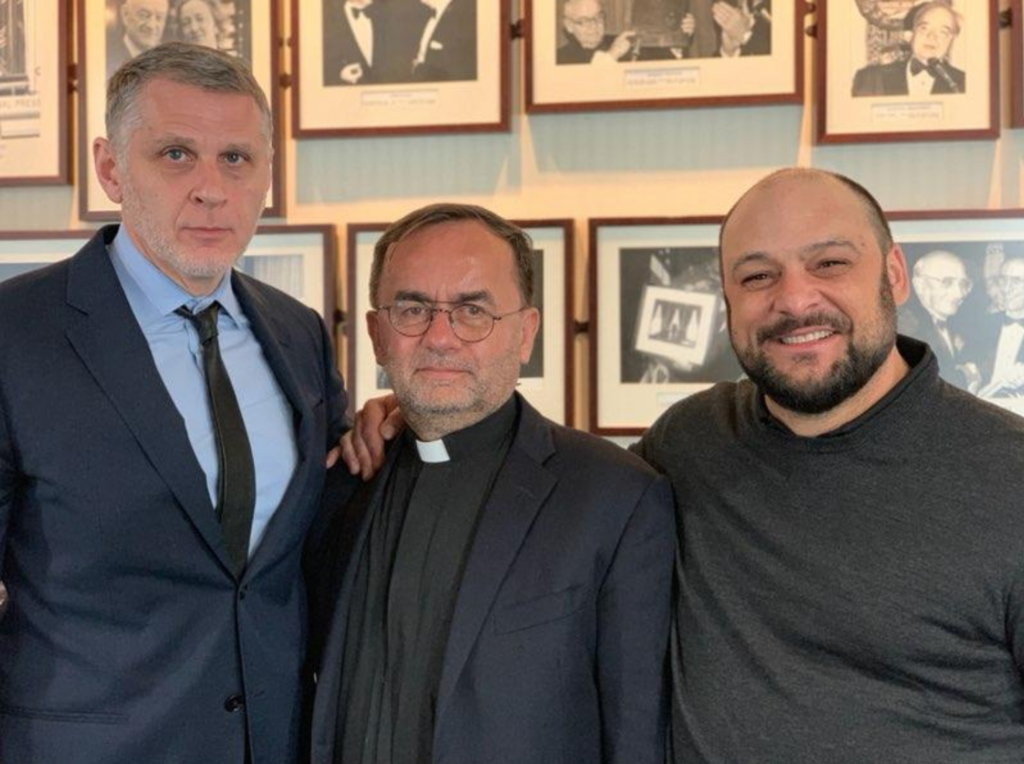
Both speakers brought unique perspectives from their work and lives, covering topics from white supremacy in America to extremists movements such as ISIS. Father Desbois offered the perspective of a historian and forensic expert, drawing from his extensive years of research spent recording the oral histories of the Holocaust by Bullets and his additional work interviewing victims of the Yazidi genocide. Christian Picciolini, as a former skinhead, drew upon his past experiences and current-day work in de-radicalizing white supremacists. Though their combined work spanned regions and decades, the similarities they illustrated between different extremist movements was particularly interesting. One notable moment was when Picciolini and Desbois discussed how studies into extremist groups have placed too much emphasis on “hate” when analyzing those communities. Extremist groups, though founded on a premise of hate, stay together because of the emotional bonds made between hate-group members through the artificial constructions of “us” versus “them.”
“A pure hate group is a mistake in [the] analysis,” said Father Desbois, to which Mr. Picciolini responded, “Hate is exhausting.”
Christian Picciolini and Father Desbois’ panel was then followed by “Nazi anti-Semitism from 1939 to the Alt-Right.” In that panel, Andrej Umansky, the CJC’s Braman Endowed Fellow of the Practice of the Forensic Study of the Holocaust, joined fellow panelist Norman Goda, the Norman and Irma Braman Professor of Holocaust Studies (University of Florida) for an in-depth discussion that made thematic connections between Nazi Germany and modern neo-Nazi and alt-Right movements of today. Their panel was moderated by Wendy Lower, the John K. Roth Professor History and George R. Roberts Fellow at Claremont McKenna College. Lower is also the author of the acclaimed book Hitler’s Furies: German Women in the Nazi Killing Fields, which reviews the role of ordinary German women on Nazi Eastern Front. During the panel, Norman Goda talked about the relationship between the media and white-supremacist movements, explaining how for white supremacists the connections between anti-Semitism and building a wall at the American southern border is clear in the mind of the extremist, but is difficult to articulate in day-to-day reporting.
During the lunch session, the Center for Jewish Civilization was thrilled to have Kristen Clarke, the President and Executive Director of the National Lawyer’s Committee for Civil Rights Under Law, give the keynote lecture of the conference. Clarke spoke about the work that she and her organization have done in the pursuit of civil rights in her speech titled “Confronting 21st Century White Nationalism.” Clarke also highlighted programs such as Election Protection and the Stop Hate Project, which moves policy into the practitioner sphere by connecting her organization to communities in need.
The afternoon sessions kicked off with a panel on “The Music of White Power, the Music of Nazi Germany: Strategies of Recruitment and Propaganda,” and was moderated by the CJC’s Assistant Professor Dr. Jessica Roda. Kirsten Dyck, an Affiliate Adjunct Professor in the Department of History (James Madison University) and J. Mackenzie Pierce, a visiting fellow at the Mandel Center for Advanced Holocaust Studies at the United States Holocaust Memorial Museum, comprised the panel. Their conversation was an ethnomusicological approach to how music and musical performance was (and is) used as a tool in white supremacist movements.
The penultimate panel of the day, “Women, White Power Movements, and the Holocaust,” was chaired by the Associate Director for the Center for Jewish Civilization, Anna Sommer. She was joined by Seyward Darby, the Editor in Chief of The Atavist Magazine, and Wendy Lower. Their panel covered the role of women in far-right movements and touched upon online communities of women that connect through shared social experiences.
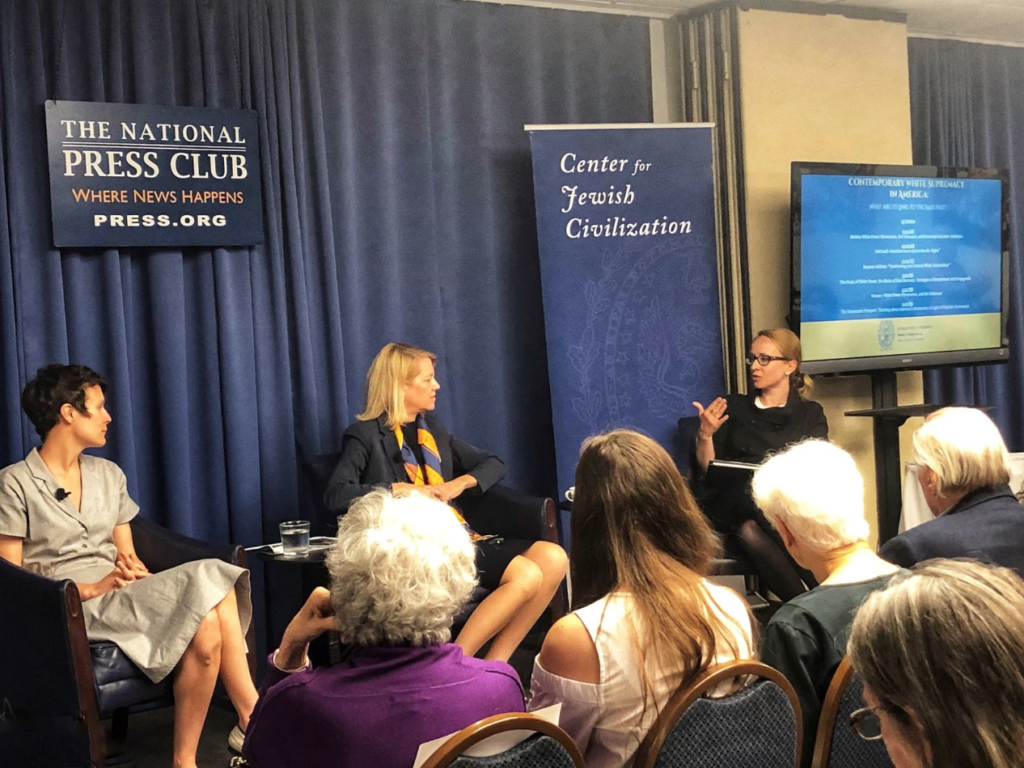
In addition, the panel discussed how women, as a whole, are often integral to social movements–the far-right movement being no exception, regardless of that movement’s normally negative views of women. For some women in white supremacist movements, gender identity matters less than their connection to their race. As Seyward Darby–who in addition to being the Editor in Chief of the Atavist has also interviewed a number of women involved in far-right movements–said, “There’s an impulse to look at the misogyny of white nationalism and assume that women don’t want to be around that…[it] assumes that a woman’s gender is the thing that she’s going to be most protective of. For a white woman, it might be her race.”
The last panel of the day, a fiery discussion about the “The Democratic Prospect: Thinking About America’s Democracy in Light of the Populist Movement,” was moderated by Danielle Pletka, a visiting lecturer at the CJC and the Senior Vice President for Foreign and Defense Policy Studies at the American Enterprise Institute. She was joined Harvard University’s Associate Professor from the Department of Sociology, Bart Bonikowski, and Benjamin Hett, a Professor of History at Hunter College and the Graduate Center at CUNY. Their conversation covered a range of divisive topics, such as global populism and the Trump administration, social perceptions of political movements, and right-wing/left-wing political divides in media.
Closing statements were given by Senior Fellow and Assistant Director for Jewish Civilization, Ira Forman. Forman, who served as the State Department’s Special Envoy to Monitor and Combat anti-Semitism, provided an overview of the days events and the common thematics that the panels had pursued throughout the day. Such thematics included the role of community building in alt-right movements, social media as a platforms for mobilization, and similarities between extremist groups in different countries.
The Center for Jewish Civilization would like to thank all of our panelists and attendees for making this an incredibly successful and engaging conference.
CJC-er of the Month: Gabriela A. Barrera
When she first arrived at Georgetown, it was her passion for literature and the humanities that drove Gabriela Barrera to take the “Fictions of Politics and International Relations” proseminar with CJC Director, Jacques Berlinerblau. At the time, her intention was actually to minor in English or Creative Writing—in part to balance her more technical International Politics major in the SFS. What she found in the proseminar, her first CJC course, however, was that the Center offered her a good middle ground between her interests in the humanities and political science.
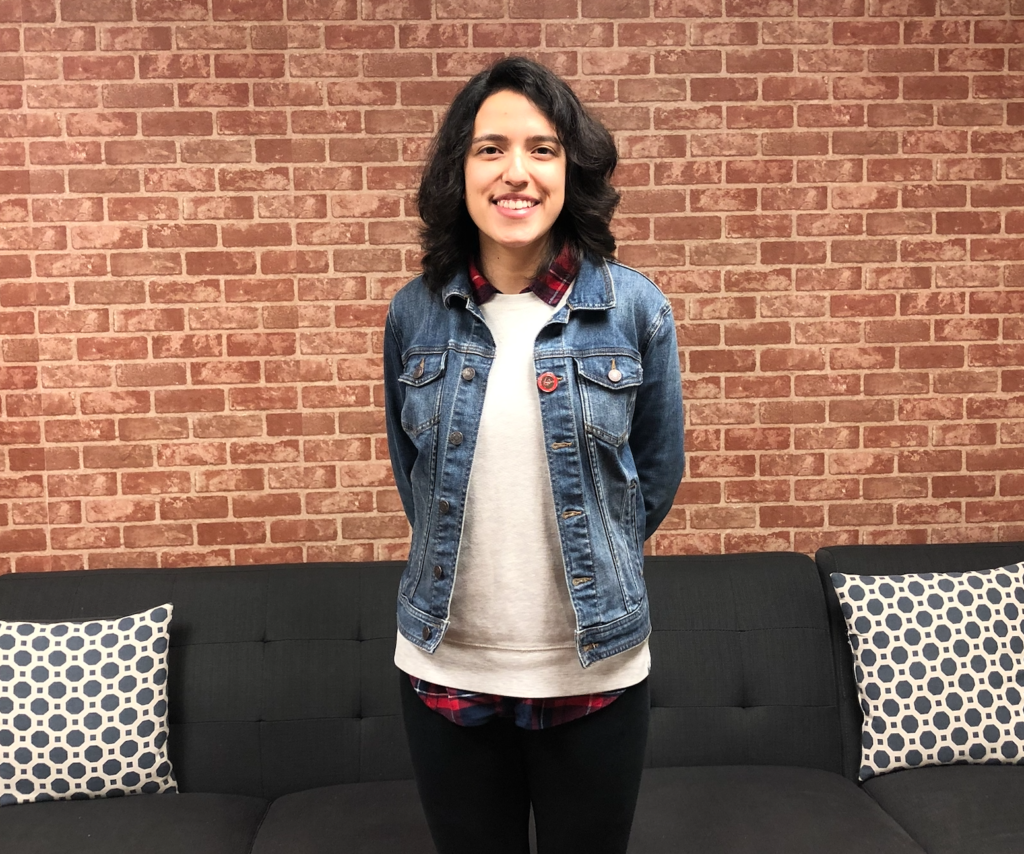
While in the CJC, Gabriela has enjoyed humanities courses like David Ebenbach’s “Fiction Writing Workshop,” Sarah Workman’s “Jewish Pop Culture,” and Meital Orr’s “Introduction to Jewish Civilization.” She has also taken CJC courses on the Holocaust and is currently taking “Holocaust and Geopolitics.”
In these Holocaust courses, Gabriela has appreciated the individualistic approach the CJC takes to the subject—“a perspective that has become so much more important as time continues to separate us from the event.” In this unique approach, these courses avoid the “impersonality” of some of her politics courses at Georgetown.
To further examine the interpersonal aspects of the Holocaust, Gabriela has participated in the CJC Holocaust Forensics Trip with Yahad-in-Unum twice. On her first trip during her Sophomore spring to Belarus and Poland, Gabriela found that “the importance that Father Desbois and his team put on preserving individual stories supplied a dignity to survivors and witnesses that was oftentimes absent in other forms of historical analysis.” Upon her return, the trip inspired her to refocus her studies towards post-conflict development and civil-military relations.
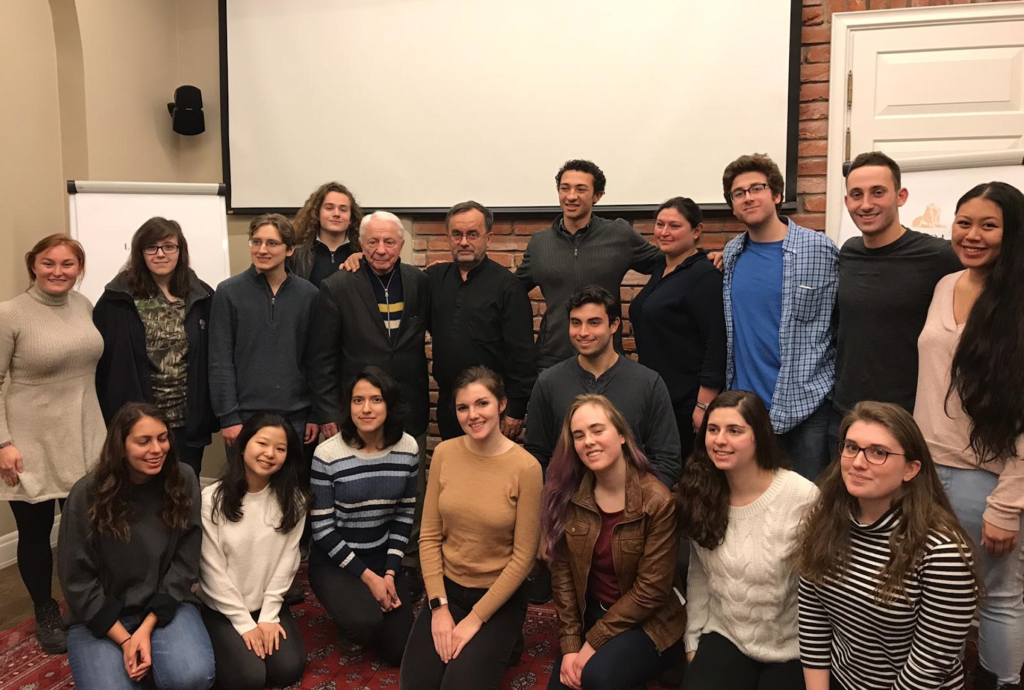
Her second trip to Ukraine impacted her in a different way: “The necessity to educate, to inform, and to preserve memory about the Holocaust has become more demanding, more urgent.” Gabriela reflects that navigating the memory of the Holocaust has become more complicated due to its politicization. This politicization has led to “competing narratives between Ukrainian, Polish, and Jewish identities that fluctuate in and out of conflict with domestic political interests.”
The difference between her experience Sophomore year and Senior year was in part due to the varying itineraries. Sophomore year, a visit to Auschwitz and Auschwitz-Birkenau forced Gabriela to reconcile the Holocaust with “what was left behind.” This spring in Ukraine, however, Gabriela was challenged by the question of how to memorialize the lesser known and more “invisible” sites of the Holocaust: “To the untrained eye, there is no surface-level difference between a mass grave and the local park. To be told, standing beneath the swaying birch trees, that thousands of Jews had been murdered in the field where we stood, was for me, incomprehensible.”
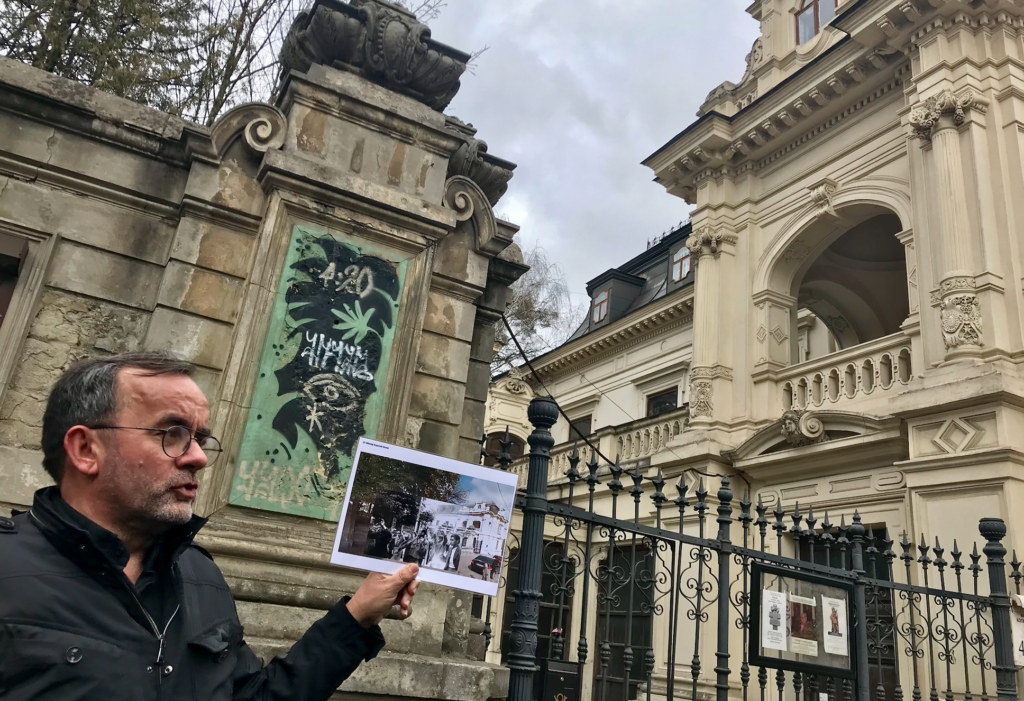
Although these experiences have been challenging, Gabriela has found them enriching. Her time at the CJC has been central to her Georgetown experience. The prospect of graduating two months from now is a challenge “when that also means leaving the Center for Jewish Civilization.” Looking beyond graduation, however, it is clear that the lessons from the CJC will stay with her as a reminder that “As a civil servant, I must hold myself and my peers accountable in the development and practice of the law. There are no excuses that justify ignorance in the face of calamity, or inaction when there is injustice.”
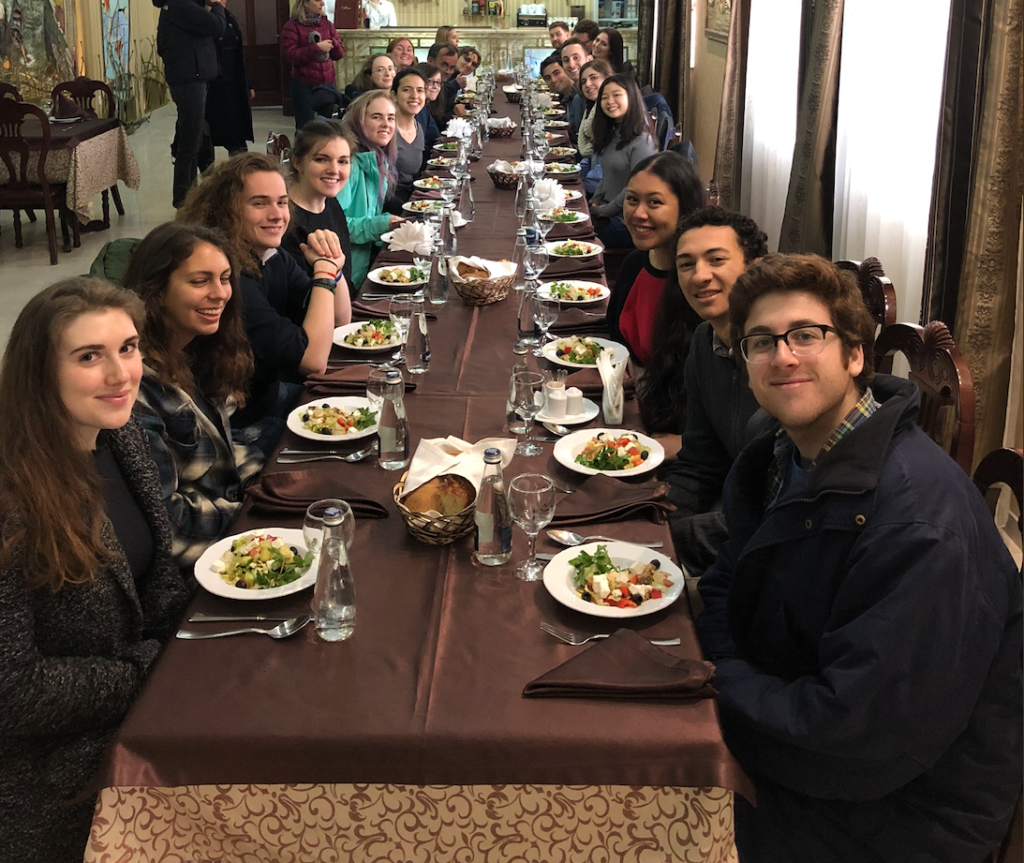
Contemporary White Supremacy in America: What are its Links to the Nazi Past?
Missed the Conference?
Catch up on the panels on our CJC Media YouTube channel HERE.
Contemporary White Supremacy in America:
What are its Links to the Nazi Past?
The Center for Jewish Civilization at Georgetown University is pleased to announce a day-long conference entitled “Contemporary White Supremacy in America: What are its Links to the Nazi Past?” Held at the National Press Club, this forum seeks to examine how hate groups in the United States draw upon ideas, propaganda, recruiting techniques, and worldviews from the Nazi era. In what ways do extremists in this country invoke the anti-Semitic theories and practices of their Nazi forerunners? And in what ways do they diverge and/or offer new perspectives and tools for disseminating hatred of Jews and others? Join us and our slate of renowned scholars, diplomats, journalists, and practitioners as we try to make sense of the current extremist moment in the United States. This event is free and open to the public.
When: Wednesday, April 10, 2019
Where: National Press Club, 529 14th St NW, Washington, DC 20045
RSVP REQUIRED to all, or part, of the conference here.
All registered attendees will be receiving a specialized QR code that they must present at the door to gain entry into the conference.
For accessibility concerns, please contact the National Press Club at 202-662-7500.
Schedule of Events*
8:55 WELCOMING REMARKS
Jacques Berlinerblau, Rabbi Harold White Professor of Jewish Civilization, Director, Center for Jewish Civilization, Georgetown University
9:00 MODERN WHITE POWER MOVEMENTS, THE HOLOCAUST, AND CONTEMPORARY ANTI-SEMITISM
Lara Logan, Former Chief Foreign Affairs Correspondent, CBS News
Fr. Patrick Desbois, Braman Endowed Professor of the Practice of the Forensic Study of the Holocaust, Center for Jewish Civilization, Georgetown University; President, Yahad-In Unum
Christian Picciolini, Co-founder, Life After Hate, Author, White American Youth: My Descent into America’s Most Violent Hate Movement–and How I Got Out.
10:15 COFFEE BREAK
10:25 NAZI ANTI-SEMITISM FROM 1939 TO THE ALT-RIGHT
Wendy Lower, John K. Roth Professor of History, George R. Roberts Fellow, Claremont McKenna College; Director, Mgrublian Center for Human Rights
Norman Goda, Norman and Irma Braman Professor of Holocaust Studies, University of Florida
Andrej Umansky, Braman Endowed Fellow of the Practice of the Forensic Study of the Holocaust, Center for Jewish Civilization, Georgetown University
12:00 KEYNOTE ADDRESS: CONFRONTING 21ST CENTURY WHITE-NATIONALISM
Kristen Clarke, President, National Lawyers’ Committee for Civil Rights Under Law
1:00 THE MUSIC OF WHITE POWER, THE MUSIC OF NAZI GERMANY: STRATEGIES OF RECRUITMENT AND PROPAGANDA
Jessica Roda, Assistant Professor, Center for Jewish Civilization, Georgetown University
Kirsten Dyck, Affiliate Adjunct Professor, Department of History, James Madison University
J. Mackenzie Pierce, Sosland Fellow, Jack, Joseph and Morton Mandel Center for Advanced Holocaust Studies, United States Holocaust Memorial Museum
2:15 COFFEE BREAK
2:25 WOMEN, WHITE POWER MOVEMENTS, AND THE HOLOCAUST
Anna Sommer, Associate Director, Center for Jewish Civilization, Georgetown University
Seyward Darby, Editor in Chief, The Atavist Magazine
Wendy Lower, John K. Roth Professor of History, George R. Roberts Fellow, Claremont McKenna College; Director, Mgrublian Center for Human Rights
3:40 THE DEMOCRATIC PROSPECT: THINKING ABOUT AMERICA’S DEMOCRACY IN LIGHT OF THE POPULIST MOVEMENT
Danielle Pletka, Senior Vice President for Foreign and Defense Policy Studies, American Enterprise Institute (AEI), Visiting Lecturer, Center for Jewish Civilization, Georgetown University
Bart Bonikowski, Associate Professor, Department of Sociology, Harvard University
Benjamin Hett, Professor, Department of History, Hunter College and the Graduate Center, CUNY
4:50 CLOSING REMARKS
Ira Forman, Former U.S. Special Envoy to Monitor and Combat Anti-Semitism, U.S. Department of State; Senior Fellow, Center for Jewish Civilization, Georgetown University
PLEASE RSVP HERE
*This schedule is subject to change. Please check our website frequently for updates.
Jacques Berlinerblau
Jacques Berlinerblau is the Rabbi Harold White Professor and Director of Jewish Civilization in the Walsh School of ForeignService. Holding separate doctorates in Sociology and ancient Near Eastern languages he has published 8 books and written dozens of scholarly articles on subjects ranging from Secularism, to Jewish-American literature, to African-American and Jewish-American relations. His next book project is on the fiction of Philip Roth. His latest publication is Campus Confidential: How College Works, or Doesn’t, for Professors, Parents, and Students, published in 2017 by Melville House.
Lara Logan
Lara Logan has served as CBS News’s Chief Foreign Affairs Correspondent since 2006. Over the last few decades she has received international recognition for her reporting in high-risk war zones and areas of political unrest. Before being promoted from her correspondent position in 2002 at CBS, Logan’s work as a reporter, editor, and producer appeared in numerous reputed outlets including CNN, NBC, Fox/SKY, ABC in London, the European Broadcast Union, and Reuters Television in Africa. She is the recipient of several awards including the Daniel Pearl Award (2011), the John F. Hogan Distinguished Service Award (2011), the John Aubuchon Press Freedom Award (2011), an Emmy Award (2008), the Association of International Broadcasters’ Best International News Story Award (2007), five American Women in Radio and Television Gracie Awards (between 2000 and 2008), and the Radio & Television Association David Bloom Award (2008).
Father Patrick Desbois
Father Desbois is President and Founder of Yahad- In Unum. In 2015, Desbois launched the initiative Action Yazidis which seeks to uncover facts of the Yazidi genocide committed by ISIS. He is the former director of the National Service of French Bishops for Relations with Judaism, and is presently Advisor to the Commission of the Holy See for Religious Relations with the Jews. Desbois holds several degrees and honorary degrees. He is the recipient of the “LBJ Moral Courage Award” by the Holocaust Museum Houston, and the Lantos Human Rights Prize from the Lantos Foundation. He has written several books on his genocide research and is the winner of the 2008 National Jewish Book Award. His latest publication is In Broad Daylight: The Secret Procedures Behind the Holocaust by Bullets, published in 2018 by Skyhorse.
Christian Picciolini
Christian Picciolini is an award-winning television producer, a public speaker, author, peace advocate, and a reformed violent extremist. His life’s work bears witness to an ongoing and profound need to atone for a grisly past, and an urgency to make something of his time on this planet by contributing to the greater good. After leaving the violent hate movement he helped create during his youth, he began the painstaking process of rebuilding his life. While working for IBM, Christian earned a degree in international relations from DePaul University, and later began his own global media firm. In 2009, Christian cofounded Life After Hate, a nonprofit dedicated to helping others counter racism and violent extremism. He is currently working to help build the world’s first global network of extremism preventionists, who are helping people disengage from hate movements and other violent ideologies around the globe. In 2016, Christian won an Emmy Award for his role in directing and producing an anti-hate advertising campaign aimed at helping youth disengage from white-supremacist groups. He has worked as an adjunct professor at the college level, and is a frequent commentator on national and international news networks. Christian Picciolini’s memoir and latest publication, WHITE AMERICAN YOUTH: My Descent into America’s Most Violent Hate Movement—and How I Got Out, where he details his involvement in, and eventual exit from, the early American white-supremacist skinhead movement, was published by Hachette Books in 2018.
Wendy Lower
Professor Wendy Lower is the Director of the Mgrublian Center for Human Rights and the John K. Roth Professor of History and George R. Roberts Fellow at Claremont McKenna College. She is the author of Hitler’s Furies: German Women in the Nazi Killing Fields, a 2013 finalist for the National Book Award. A few of her other books are The Diary of Samuel Golfard and the Holocaust in Eastern Galicia, Lanham MD: Altamira/Rowman and Littlefield and USHMM, 2011, The Shoah in Ukraine: History, Testimony, Memorialization, Bloomington: Indiana University Press, 2008 (co-edited with Ray Brandon) and Nazi Empire-Building and the Holocaust in Ukraine, Chapel Hill: University of North Carolina Press and USHMM, 2005 (paperback, 2007, audio version 2010).
Norman Goda
Norman J.W. Goda is the Norman and Irma Braman Professor of Holocaust Studies. He received his Ph.D. from the University of North Carolina at Chapel Hill. He studies modern European history and specializes in the history of the Holocaust, war crimes trials, and twentieth century diplomacy. He teaches a variety of courses on the Holocaust and Nazi Germany from historical and interdisciplinary perspectives. He is the author of Tomorrow the World: Hitler, Northwest Africa, and the Path toward America (1998); Tales from Spandau: Nazi Criminals and the Cold War (2007); The Holocaust: Europe, the World, and the Jews (2013). He has also co-authored, with Richard Breitman, US Intelligence and the Nazis (2005) and Hitler’s Shadow: Nazi War Criminals, US Intelligence and the Cold War (2010). He has published articles in various journals including the Journal of Modern History, The International History Review, and The Journal of Contemporary History, and his work has been the subject of stories by the The New York Times, the Associated Press, US News and World Report, and other major news outlets. Goda has served as a consultant to the US and German governments, as well as for various radio, television, and film documentaries in the US, Europe, and Israel. His latest publication, Jewish Histories of the Holocaust: New Transnational Approaches (Making Sense of History), was published by Berghahn Books in 2016.
Andrej Umansky
Andrej is a Research Fellow, Faculty of Law at the Institute for Criminal Law and Criminal Procedure, University of Cologne, Germany, and is historical and legal advisor to Yahad-in-Unum. He obtained a master’s degree in French and German law from the Universities of Cologne and Paris I and another master’s degree in the history of the Holocaust in Eastern Europe from the University of Paris IV. In 2016, he finished his PhD at the University Amiens, France, about the Holocaust in the Northern Caucasus in 1942-43. His work led informed his book, La Shoah a l’Est: Regards d’Allemands. He serves as Secretary General for the Yahad In-Unum.
Keynote Speaker: Kristen Clarke
Kristen Clarke is the president and executive director of the National Lawyers’ Committee for Civil Rights Under Law, an organization that seeks to promote fair housing and community development, economic justice, voting rights, equal educational opportunity, criminal justice, judicial diversity and more.
Ms. Clarke’s career has been dedicated to the strengthened American democracy by combating discrimination faced by African Americans and other marginalized community. She has pursued that calling through careers at the Civil Rights Bureau for the New York State Attorney General’s Office, the NAACP Legal Defense and Educational Fund, Inc., and the U.S. Department of Justice Civil Rights Division. Within each position, she has served the country through the enforcement of civil rights on matters such as criminal justice, education and housing discrimination, fair lending, voting rights, immigrants’ rights, gender equality, reproductive access, LGBT issues, police misconduct and brutality, and human trafficking.
Her honors and awards include the 2018 Louis L. Redding Lifetime Achievement Award, 2018 Harvard College Service to Society Award, the 2017 Choate Rosemary Hall Alumni of the Year, the 2017 Thurgood Marshall Award from Quinnipiac University School of Law, the 2016 Alumni of the Year by the National Black Law Students Association, the New York Law Journal’s 2015 Rising Stars, the 2014 New York State Senate Proclamation for Exemplary Service, the 2012 Best Brief Award for the 2012 Supreme Court term from the National Association of Attorneys General, among others.
Jessica Roda
Jessica Roda is an anthropologist and ethnomusicologist currently serving as an Assistant Professor at the Center for Jewish Civilization. She earned Ph.D.s from both Sorbonne University and the University of Montreal where she studied political implications of Sephardic and Arab-Jewish music and the Unesco Convention of Intangible Cultural Heritage, respectively. More recently, Dr. Roda began an ethnography of Ultra-Religious Jewish Life in Montreal and New York City. Before joining the Center, Dr. Roda was a postdoctoral fellow at McGill University (Department of Jewish Studies), Concordia University (Department of History and Anthropology/Sociology), and University of Quebec in Montreal (Canada Research Chair in Urban Heritage). In 2014, she was selected by the Royal Society of Canada and the Science Coucil of Japan to participate in WISET Program. She has been a visiting scholar at UCLA (Department of Ethnomusicology), Columbia University (Heyman Center), and Universidade Estadual de Cambinas, Brazil. Beyond her academic life, she is also trained as a pianist, flutist, and modern-jazz dancer (City of Paris Conservatory). Her latest publication, “From French Guiana to Hasidic Montreal,” was published in the Association of Jewish Studies magazine, AJS Perspectives, in 2018.
Kirsten Dyck
Kirsten Dyck is the author of Reichsrock: The International Web of White-Power and Neo-Nazi Hate Music (Rutgers University Press, 2017). She currently works as a U.S. Peace Corps Volunteer in the English Philology Department at Poltava National V.G. Korolenko Pedagogical University in Poltava, Ukraine. She is also an Affiliate Adjunct Professor with the History Department at James Madison University. She has held fellowships with the U.S. Holocaust Memorial Museum, the German-American Fulbright Commission, and The Auschwitz Jewish Center. She holds a BFA in Music and an MA in Ethnomusicology from York University in Toronto, Canada, as well as a PhD in American Studies from Washington State University.
J. Mackenzie Pierce
Mackenzie Pierce received his PhD in musicology from Cornell University and is currently a visiting fellow at the Mandel Center for Advanced Holocaust Studies at the United States Holocaust Memorial Museum. His articles have been published or are forthcoming in the Journal of Musicology, 19th-Century Music, and in the first edited volume devoted to the composer Roman Palester. His research has led to collaborations with international scholarly communities and performers. A highlight of this work was the scholarship and performance festival “Forbidden Songs” in spring 2018, which featured six US premieres of works by Palester and the premiere of Poland’s first postwar feature film with new English subtitles. His research has been supported by fellowships and grants from the Polin Museum for the History of Polish Jews in Warsaw, the Title VIII Program of the US State Department, the Kosciuszko Foundation, and the Beinecke Foundation.
Anna Sommer Schneider
Anna Sommer Schneider is Associate Director and Associate Teaching Professor for the Center for Jewish Civilization. She received her Ph.D. from the Department of Jewish Studies at the Jagiellonian University in Kraków, Poland. She is the author of She’erit Hapletah: Surviving Remnant. The Activities of the American Jewish Joint Distribution Committee in Poland, 1945-1989 (2014, Published in Polish) and co-author of Rescue, Relief and Renewal: 100 Years of the Joint in Poland (2014), and she co-curated an exhibition of the same title that year. She is also the author of numerous scholarly and critical articles of Holocaust memory and the history of the Jews in post-World War II Poland. Her most recent writings include “The Survival of ‘Yiddishkeit’: Impact of the American Jewish Joint Distribution Committee on Jewish Education in Poland, 1945-1989.” She served as a guide and educator at the State Museum of Auschwitz-Birkenau in Oświęcim between 1998-2018.
Seyward Darby
Seyward Darby serves as the editor in chief of The Atavist Magazine. She formerly held positions at other esteemed news sources as deputy editor of Foreign Policy and online editor of The New Republic. In September 2017, her article on women in the alt-right movement, “Rise of the Valkyries”, was chosen as the cover story for Harper’s Magazine. Her scholarship on the topic has been spotlighted by National Public Radio. Currently, Darby is writing a book about women and white nationalism in America. Her focus is on social justice and culture.
Danielle Pletka
Danielle Pletka is senior vice president for foreign and defense policy studies at the American Enterprise Institute (AEI), where she oversees the Institute’s work on foreign policy and the Middle East. She has master’s degree from the School of Advanced International Studies at Johns Hopkins University and a Bachelor of Arts degree from Smith College. Her most recent publication is a report entitled “Tehran Stands atop the Syria-Iran Alliance,” published in 2017 by the Atlantic Council.
Bart Bonikowski
Bart Bonikowski is an Associate Professor of Sociology and a faculty affiliate of the Center for European Studies, the Weatherhead Center for International Affairs, and the Institute for Quantitative Social Science. Relying primarily on innovative survey and network analysis methods, his research applies insights from cultural sociology to the study of politics. Bonikowski’s most recent work examined the impact of trade and IGO networks on cross-national attitude diffusion, as well as the consequences of within- and between-country variation in popular understandings of the nation-state for political change. He is currently launching a new project on the logic of populist discourse in democratic polities, focusing on popular attitudes, media representations, and political messaging. Bonikowski’s publications have appeared in the American Sociological Review, The International Journal of Comparative Sociology, and a number of edited volumes. His latest publication, “Populism and Nationalism in a Comparative Perspective: A Scholarly Exchange,” can be found in Nations and Nationalism.
Benjamin Hett
Benjamin Hett was born in Rochester, New York but grew up in Edmonton, Alberta, Canada, leaving him with a lifelong if mostly heartbreaking attachment to the Edmonton Oilers of the NHL. He earned a BA in Political Science and English Literature from the University of Alberta (1987) and then a J.D. from the University of Toronto (1990). Four years of legal practice – it felt like eight – convinced him to return to the University of Toronto for an MA in History (1995) before he moved on to Harvard for a Ph.D. (2001). For two years he taught in the History and Literature program at Harvard alongside advising graduate students at the Harvard Law School. In 2003 he joined the faculty of Hunter College and in 2006 that of the Graduate Center, CUNY. Hett’s work has gradually shifted from a focus on the theory and practice of criminal law in Germany, through the legacy of National Socialism in postwar Germany, to the Second World War on the Eastern front and the work of West German intelligence services in the 1950s. He is the author of three books (Death in the Tiergarten, 2004; Crossing Hitler, 2008; Burning the Reichstag, 2014) and a number of articles. Hett has been a recipient of the Hans Rosenberg Prize for the best article on German history by a North American scholar; the Fraenkel Prize from the Wiener Library in London; and fellowships from the Guggenheim Foundation and the American Council of Learned Societies. His latest publication,The Death of Democracy: Hitler’s Rise to Power and the Downfall of the Weimar Republic was published by Henry Holt and Co. in 2018.
Ira Forman
Ira N. Forman is a Senior Fellow on Anti-Semitism at the Center for Jewish Civilization and a Senior Fellow at the Moment Institute. In the fall of 2018, he was appointed Senior Advisor on Anti-Semitism at Human Rights First. Mr. Forman served as the State Department’s Special Envoy to Monitor and Combat Anti-Semitism from 2013-2017. From 2011-2012 he served as the Jewish Outreach Director for the Obama for America campaign. He also served for nearly 15 years as the Executive Director of the National Jewish Democratic Council (NJDC). Mr. Forman received his B.A. from Harvard University where he graduated Magna Cum Laude in Government. He received his M.B.A. from Stanford University’s Graduate School of Business. He co-edited and wrote for the reference book Jews In American Politics.
CJC-er of the Month: Jocelyn Ortiz
When Jocelyn Ortiz was deciding on where she would study abroad during her 2018 Fall semester, she knew she “really wanted to live somewhere that had the same relaxed mentality that California (where I’m from) has, and I wanted to be close to the beaches and the outdoors.” Ortiz, a History Major in the College with a Minor in Jewish Civilization Arabic, ended up choosing the University of Sydney in Australia. Her initial hope to balance her academic workload with outdoor activities was fulfilled when she learned to surf just off of Sydney’s famous coasts.
While at the University of Sydney, Ortiz participated in a number of on and off campus activities. She worked as a Residential Assistant at Urbanest Student Accommodations, a housing service for visiting students, and participated in the University’s international student society.
As a student of U-Syd, Ortiz pursued her interest in activism and the law. “I learned a lot about indigenous history and culture, and the ongoing fight against inequality within Australia (Aboriginal people often have less access to education, job opportunities, and welfare services). I met a lot of Aboriginal activists and was surprised not only by their persevering attitude but also by the fact that they were very much in tune with their culture and still habitually practiced traditional Aboriginal cultural activities such as dance, art-making, and community building.” Ortiz was able to engage with these local actors through the University of Sydney’s Indigenous Studies Program.
When she wasn’t learning about indigenous social justice, Ortiz made sure to immerse herself in Sydney’s cultural and social life. “Most Thursday nights I was able to make my way down to the Sydney Opera House and Harbour Bridge area and watch the sunset. There’s a great national botanic garden on the other side of the Opera House and my friends and I would take a walk through all of the different flower and tree gardens.” At the Opera House, Ortiz saw the first rap artist to ever perform at the venue. In September, “I saw Skepta, a Britist Grime artist from London who sold out the event.”
Back on the Georgetown campus, Ortiz is an editor for the feminist-literature magazine, Bossier, and a member of Delta Phi Epsilon, an undergraduate foreign service sorority. Ortiz is also a research intern at the Public International Law and Policy Group (PILPG), where she works with PILPG’s founder and president, Dr. Paul Williams. “There, I work on helping Dr. Williams and his pro-bono legal/research team with research pertaining to war crimes prosecution, transitional justice negotiations, and human rights violations.” At the Center for Jewish Civilization, Ortiz is a Teaching Assistant for Professor Jessica Roda’s and Father Patrick Desbois’ class, “The Geopolitics of the Holocaust.”

